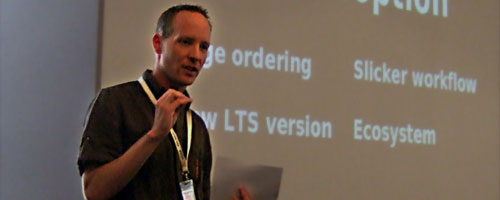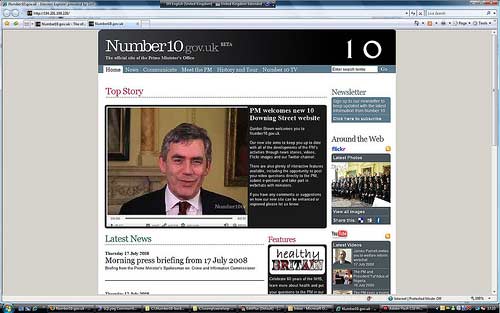
A week since the inaugural WordCamp UK, and I haven’t got round to writing up my session on ‘WordPress in large organisations’ – specifically, government. Then again, with Chris Garrett and Dave Briggs doing it on my behalf, why should I? 🙂
My key message was that in many large organisations, there’s often open warfare between marketing/PR, the IT department, and Procurement. But with WordPress (price: zero) designed to be used by solo bloggers with no IT support, it effectively allowed the marketing people to sneak past the other two, and get feature-rich sites up in no time. Its ‘straight to content authoring’ interface suited the comms person mentality, and RSS would allow for seamless integration if the ‘main website’ people got annoyed.
I then talked about a few other things I could see WordPress doing in large organisations, which may not be immediately obvious. For once, if you don’t mind, I’m going to keep quiet on those; the ideas aren’t yet fully developed, and I don’t want people stealing them just yet. I’ve got a mortgage to pay.
I closed on four things I thought WordPress needed to become a stronger force in the corporate world:
-
Drag-and-drop page ordering, on the admin interface. We’ve got it for other elements, but pages would have been my priority.
-
A slightly slicker workflow. WordPress has all the ‘draft awaiting approval’ functionality it needs, but the presentation is lacking. Plugins may help, but it’s an extra layer of risk, due to…
-
The need for a new ‘Long Term Support’ version. I’ve mentioned this before. At the moment, there’s no guarantee that plugins working in the current WP version will work in any subsequent version. The official policy on security is to upgrade as soon as a new version becomes available… but that’s a risk many corporate clients won’t like. There is a ‘legacy branch’ (horrible name), but it’s based on the dated v2.0. We need a newer one, based on the v2.5+ dashboard, with a commitment to update it with security patches.
-
A proper WordPress ‘ecosystem’. There’s a lot of interest in the platform, and plenty of work to go round. But I’ve learned recently that it takes a certain expertise to get the most from WP; you can’t just give it to any PHP programmer. We need people to identify themselves as WP experts, and help each other build businesses out of this.
The highlight of my session, inevitably, was the news that 10 Downing Street would be launching shortly on WordPress. I’ve written countless times about the persuasiveness of precedents; is that a big enough precedent for you? I got a round of applause for it, too. 🙂
The scary part was when I sat down. Throughout the weekend, there was a constant stream of chatter on Twitter. It was no-holds-barred stuff at times. And as I hit ‘refresh’, I was genuinely terrified to see what would come up. Thankfully, the few comments there were, were positive, even complimentary.
And some of the participants have been really nice about me in their reports: attention-grabbing, rousing, showstopper. ‘The only session that really had everyone buzzing‘. ‘A pity that it isn’t Simon that’s running the country!’ Thank you all. (Not sure about that last one, by the way.)
Which reminds me. I haven’t had any speaking engagements in ages. If anybody in the central government world wants me to come in, and talk to staff / management about all this stuff, I’d be glad to. Just ask.
Picture credit: Richard Williams, RKW Internet.
 Crime mapping is front-page news today (in the
Crime mapping is front-page news today (in the 
